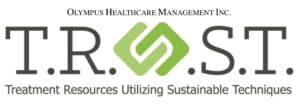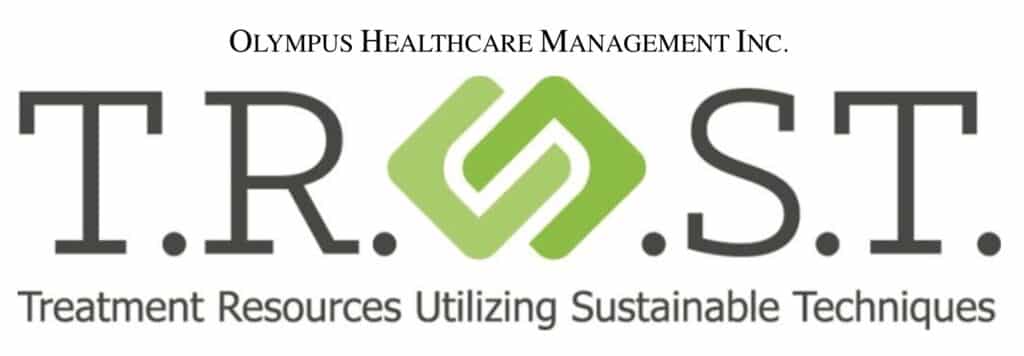
Our Services
T.R.U.S.T. offers a professional, comprehensive and long-term case management solution embracing a cutting-edge, executive care coaching approach based on healing…
T.R.U.S.T. integrates family structured services throughout our long-term comprehensive case management process. Our team of highly qualified health professionals will provide the addicted persons and/or their families with:
Services
Through an interactive and collaborative assessment process, your Wellness Coach will help you identify, achieve and maintain clear concrete goals that support your continued and strengthened recovery from alcoholism and other addiction. Within a holistic framework, areas of focus typically include recovery needs, work life, interpersonal relationships, recreation and leisure activities, and overall well-being.
Coaching services are offered both virtually by either phone or video-conferencing as well as in person in select locations. Your Wellness Coach will help you decide if working individually or in a group setting is right for you.
Relapse prevention, sometimes referred to as recovery maintenance coaching, focuses on identifying and integrating the thoughts and actions that help strengthen, promote and protect one’s recovery from addictions and compulsive behaviors. In individualized sessions, your Coach will help you identify triggers and high risk situations that could lead to relapse, learn about and utilize useful recovery protective tools and strategies and discover your own early warning signs that could signal you are on the road to relapse. This strengths based, psycho-educational approach will support you in protecting your recovery.
Cognitive Behavioral Therapy (CBT) is widely utilized in treating addictions, as well as anxiety and mood disorders. The tools and techniques employed aim to modify dysfunctional thoughts, emotions and behaviors. CBT focuses on solutions and encourages you to challenge unhelpful thoughts and change dysfunctional, often destructive patterns of behavior.
A basic tenet of CBT is that thoughts and perceptions influence emotions and behaviors. In some cases, feeling distressed may determine one’s perception of reality. CBT techniques help you identify harmful thoughts, challenge them and change them to functional, helpful thoughts and actions.
An ample body of evidence exists demonstrating the effectiveness of CBT in treating addiction, anxiety and mood disorders, and Post Traumatic Stress Disorder. Additionally, evidence supports the use of CBT techniques in individual and group settings as well as in-person and/or virtually delivered services.
Originally developed to treat people with Borderline Personality Disorder (aka Emotional Instability Disorder), Dialectical Behavior Therapy (DBT), has emerged as an evidence based psychotherapy employed to treat a variety of conditions that feature self-destructive behavior.
In DBT , the core behavioral skill sets taught include mindfulness, distress tolerance, interpersonal effectiveness and emotion regulation.
Eye Movement Desensitization and Reprocessing is a well-researched psychotherapy that fosters healing from trauma and emotional distress that result from disturbing life experiences. The central tenet of EMDR is that the mind is capable of healing from psychological trauma much the same as the body is able to heal from physical trauma. With specific evidence-based protocols, the skillful EMDR clinician employs techniques that supports the client’s natural healing processes.
Ample evidence supports the effectiveness of EMDR in treating people who have experienced both single-episode and multiple-episode traumatic events. Since its inception, millions of people have been successfully treated with EMDR. Emerging evidence supports it’s use via tele-health.
Effective contemporary psychodynamic approaches for treating people with alcoholism and addiction help one focus on developing healthy self-esteem, manage feelings effectively and remove roadblocks to healthy attachment and mutual interdependence. In work with a psychodynamic therapist, attention will be paid to the quality of the connection between therapist and client and explore early life experiences and struggles, sources of emotional pain and suffering, and the impact that one’s unconscious has on their present mood and behaviors.
Gestalt therapy is a humanistic, interactive and holistic form of psychotherapy that places primacy on the here and now experience, within the context of understanding one’s bio-psychosocial history and current context; focuses on the total person; and attends to the healing power of the relationship between the therapist and the client. The development of awareness is viewed as a primary goal of Gestalt Therapy as it is believed to be the pathway to greater self-regulation and optimal functioning in the world. Paradoxically, the goal is not on change per se, but on deepened awareness. Gestalt Therapy employs a variety of techniques, including the empty chair work, the use of present tense language, “I” statements’ and dream work. More than a set of techniques, the Gestalt Therapist attends to cultivating an authentic and active partnership where one can discover and more fully be themselves in all spheres of their lives.
Developed within a coherent theoretical and philosophical framework, Acceptance and Commitment Therapy (ACT) is a unique empirically based psychological intervention that uses acceptance and mindfulness strategies, together with commitment and behavior change strategies, to increase psychological flexibility. The core messages of ACT inform its name: 1) learn to accept what is out of your personal control and 2) commit to action that improves and enriches your life.
For many addicted people, developing essential life skills is a vital component of the recovery process. Our team of coaches support clients in developing the comprehensive life skills needed to support long-term relapse prevention and complete activities of daily living. Training is available that addresses household maintenance, financial responsibility, effective interpersonal communication, and job search support. Developing and strengthening these life skills enhances self-competency and enriches one’s foundation in recovery.
A central tenet of our clinical philosophy is that working with the whole family is what works in treating addiction. In our opinion, long gone are the days when the addicted person did his or her work in isolation or in parallel to the other family members do their work. Our coaches approach family work informed by various modalities. Having said that, our preferred approach to working with families is a model called Structured Family Recovery®
Structured Family Recovery® (SFR) was developed by Debra Jay and is fully described in the book It Takes A Family. The SFR worker will invite all family members to participate in a series of structured, recovery oriented conversations designed to support each family member in creating and strengthening their own program of recovery. SFR is informed by the clinical practices utilized in the treatment of addicted pilots and physicians whose outcome studies demonstrate a robust, 80% success rate at the 1-year and 5-year mark. SFR transforms a family into a recovery support team and offers a safe, effective means of building a bridge back to healthy family life. SFR is delivered by design via phone conference as it eliminates many of the typical obstacles to engaging in family work, chief amongst them geographical differences. All of our SFR counselors have been trained in the method by Debra Jay.
Our consulting psychiatrists, Dr. Edmund Griffin and Dr. Raju Mangrola, are available for psychiatric consultation and medication management as needed.
Medication-assisted treatment (MAT), including opioid treatment programs (OTPs), combines behavioral therapy and medications to treat substance use disorders. MAT is especially helpful in the treatment of opioid dependence and is recommended by the National Institute on Drug Abuse, Substance Abuse and Mental Health Services Administration, National Institute on Alcohol Abuse and Alcoholism, and Centers for Disease Control and Prevention. We accept referrals currently on prescribed MAT medications and also offer consultation to clients to determine if a MAT protocol is appropriate for them.
Most people in early recovery benefit greatly by learning how to relax, have fun and socialize without the use of alcohol or drugs. For some, leisure and recreation activities will also serve as an aid to managing difficult emotions, to learn more about yourself, and to make new friends.
This may entail discovering new activities, managing social anxiety, or learning how to do familiar activities without drugs or alcohol. In addition to learning how to have fun and socialize, people in early recovery also need support in learning how to relax and unwind.
Our Wellness Coaches will work with you to assess your strengths and challenges in developing the skills to both have fun and relax in sobriety. At TRUST, we believe that creating balance and a robust social network is integral to overall well-being and long-term recovery.
Whether you are recovering from an eating disorder or have concerns about improving your overall health and wellness through good nutrition, we will arrange for you to meet with one of our nutritionists. The nutritionist will conduct a comprehensive assessment of your nutritional status, eating behaviors and attitudes toward food, develop a nutritional plan and help you implement, monitor and evaluate that plan as needed.
Our Nutritionist and Wellness Coach will work in tandem to support you in both recovering from an eating disorder and eating in a manner consistent with optimal health and wellbeing.
Additional Service
An intervention is a carefully planned process typically performed under the auspices of a trained and certified interventionist to help motivate an addicted loved-one to seek professional addiction treatment. If you are wrestling with a loved one’s active addiction, please contact us to see if an intervention could be of help.
On our team are several interventionists, trained and certified in various methods of intervention. We will work with your addicted loved one’s family and friends to empathically and skillfully encourage your addicted loved one to accept the need for professional help.
CRAFT, developed by Dr. Robert Meyers in the 1970s, is a time limited treatment approach designed to help the family members and concerned significant others of a treatment-refusing addicted loved one to move their loved one toward treatment. CRAFT has the dual focus of improving the quality of life of the concerned significant others as well as promoting the addicted loved one’s movement toward treatment and sobriety. The CRAFT method boasts a high success rate in getting people into treatment utilizing motivational techniques.
Addiction doesn’t just impact individuals; it affects their family, friends, co-workers and most importantly, their spouses/significant others. Often, couples, where one partner is in recovery, have the need to work on reestablishing trust and safety, as well as develop healthy patterns of communication.
Couples Coaching helps partners hear and understand each other, develop healthy communication, and reestablish trust and safety. Quite often, couples therapy improves relationship functioning and can enhance abstinence.
Evidence indicates it is an essential component of addiction treatment and is recommended by the American Society of Addiction Medicine. As an adjunct to behavioral therapy and/or Medication Assisted Treatment, drug testing serves as an external source of accountability, can help strength the trust of loved ones and can facilitate a rapid response to relapse.
Soberlink Devices use facial recognition technology to confirm identity during each breath test. BAC results are wirelessly transmitted in real-time to Soberlink’s cloud-based alcohol recovery management software. The Soberlink System allows for custom testing schedules, as well as specific notification and automated report settings. Soberlink provides another measure of accountability, serves to help protect recovery, facilitates a rapid response to relapse and helps reestablish trust with one’s loved ones.
A professional sober companion can accompany an addicted person in recovery to professional and/or familial events and other stressful events when additional support is necessary. Sober companionship can serve as an aide in protecting recovery. Sober companionship can be made available for 24/7 support, on-call support, and for specific activities.
12 Step Philosophy Integration
The basic idea of the 12–Step program is to give people struggling with addiction a process through which to understand and manage their substance use disorders, as well as to find social support for re- covery through others who are dealing with the same struggles.
Twelve-Step support groups are part of the 12-Step recovery program of Alcoholics Anonymous, Nar- cotics Anonymous and other recovery programs. Participants work through the 12 Steps and regularly attend meetings to share experiences and give and receive support from others in recovery. Most will also work with a sponsor — a more experienced person in recovery — who they can turn to for support.
The core philosophy of AA/NA emphasizes personal accountability, abstinence, humility, honesty, pow- erlessness over addiction and connection with a higher power.

The 12 Steps of Alcoholics Anonymous (which have been modified for other addictions and compulsive behaviors) are as follows:
01
We admitted we were powerless over alcohol–that our lives had become unmanageable.
02
Came to believe that a Power greater than ourselves could restore us to sanity.
03
Made a decision to turn our will and our lives over to the care of God as we understood Him.
04
Made a searching and fearless moral inventory of ourselves.
05
Admitted to God, to ourselves, and to another human being the exact nature of our wrongs.
06
We're entirely ready to have God remove all these defects of character.
07
Humbly asked Him to remove our shortcomings.
08
Made a list of all persons we had harmed, and became willing to make amends to them all.
09
Made direct amends to such people wherever possible, except when to do so would injure them or others.
10
Continued to take personal inventory and when we were wrong promptly admitted it.
11
Sought through prayer and meditation to improve our conscious contact with God as we understood Him, praying only for knowledge of His will for us and the power to carry that out.
12
Having had a spiritual awakening as the result of these steps, we tried to carry this message to alcoholics, and to practice these principles in all our affairs.
What are the benefits of 12-step support groups?
Since its founding in the 1930s, the 12-Step program has become one of the most widely used approach- es to treat substance abuse and other addictions and compulsions. With a worldwide membership in the millions, and meetings located in most communities throughout the world, 12-Step support groups are free, easily accessible and highly effective for some. Other benefits of 12-Step support groups include:
01 Access to a sober peer support system
02 Emphasis on personal accountability and a spiritual connection
04 Twelve-Step groups can be used in conjunction with other treatments
12 Step Alternatives
The 12-Step program works for many people in recovery, but not all. Others may prefer to get involved in 12-Step alternatives such as SMART Recovery or LifeRing, some of which place less emphasis on spirituality (or involve a different kind of spirituality), encourage moderation rather than complete abstinence, and make other key variations to the 12-Step principles.
WHAT CONDITIONS/DISORDERS DO 12-STEP SUPPORT GROUPS TREAT?
Although Alcoholics Anonymous and Narcotics Anonymous are the largest 12-Step programs, there are also dozens of support groups for other addictions and compulsive behaviors, such as:
- Cocaine Anonymous
- Crystal Meth Anonymous
- Co-Dependents Anonymous
- Sex and Love Addicts Anonymous
- Sex Addicts Anonymous
- Adult Children of Alcoholics
- Gamblers Anonymous
- Marijuana Anonymous
- Food Addicts Anonymous
- Overeaters Anonymous
- Pills Anonymous
- Workaholics Anonymous

There are also 12-Step support groups specifically geared toward families of those with addictions and compulsions, such as Al-Anon, Nar-Anon and Alateen. These groups provide free education and support to help loved ones care for themselves and support their family member in recovery.
Sponsorship Encouragement
What is a sponsor in a 12 step program?
A sponsor is a senior member of AA or NA who has been in recovery for usually at least a year. Sponsors help you navigate membership, answer questions, work on the 12–steps, and offer accountability. A sponsor is also a confidant who understand where you have been.
How long do you have to be sober to be a sponsor? Although there are no formal sponsorship rules, it’s recommended that a sponsor has at least one to two years of sobriety before they begin to sponsor.
What is the role of a sponsor in recovery?
The Role of Sponsorship in Addiction Recovery Sponsorships in addiction recovery are meant to offer guidance, explanation, encouragement, and support. Your sponsor may also provide other vital functions that someone new in sobriety needs. … A sponsor is someone to whom a sponsee has some accountability.
How do you pick a sponsor?
What should be considered when choosing a sponsor?
- Take into account the amount of time a potential sponsor been sober.
- Consider the sex of your sponsor.
- Examine a potential sponsor’s sobriety.
- Consider how many other sponsees he/she has.
- Find someone who has what you want.
